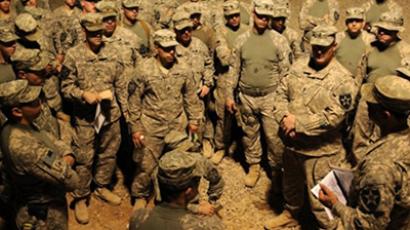Selling America’s wars to the people

The Pentagon budgets half a billion dollars to market its wars. Call it public relations or call it propaganda, it’s meant to win the hearts and minds of Americans. Critics argue it comes at the price of the truth.
When it comes to Afghanistan and Iraq, the stories American’s hear from the US media often sound optimistic.The story lines often follow the official line of the United States Department of Defense very closely. For example, US media networks reported “the last American combat troops in Iraq” leaving, calling it “historic.” Nevermind that 50,000 American troops remain in Iraq with reports on the ground confirming some of those troops, at least 4500 Special Ops forces continue to be directly engaged in military operations. It’s not coincidental. To build a narrative of “progress,” the Pentagon spends a lot of money and effort in what critics like Jake Diliberto, who served as a marine in Afghanistan and Iraq, call propaganda.Diliberto has helped launch a campaign to counteract it. “The Pentagon has really pulled a curtain over the mainstream media,” said Diliberto. “The mainstream media want the story they want to tell this story of the American hero."And many people may think the US military’s whole counterinsurgency strategy is about winning hearts and minds on the ground in Afghanistan and Iraq, but this strategy is also about winning them at home. This helps explain why the Pentagon budgets more than $500 million to market and sell the wars to Americans, to influence public opinion right here in the USOfficials argue that isn’t exactly the case.“If I tried to change your opinion about a policy or practice of department of defense, that’s influence,” argued Robert Hastings, from Pentagon public affairs. “The role of public affairs is to provide you the information so you can make your decision yourself.”So they say, but the reality of the wars’ trillion dollar costs, thousands of casualties, and millions of people displaced, aren’t summed up in this line:“We’re making progress…progress,” General David Petraeus, Commander, International Security Assistance Force, said in a series of different news reports.And as the story of famous US soldier Pat Tillman, who gave up a multi-million dollar contract in professional football, illustrates, misinformation is provided, too.Tillman was killed by friendly fire, but to create a heroic story, the military covered up the details of Tillman’s death and soldiers were asked to lie.Army veteran and Iraq war resister Matthis Chiroux who wrote for military newspapers, some meant to influence US lawmakers, said an agenda was always clear.“Always positive,” indicated Chiroux. “You won’t see a single thing critical of the military in anything I wrote.”With all this information being what's provided by the Pentagon, you have to wonder if Americans will ever understand the reality of the wars their country is fighting.“When you go to war innocent people die,” reiterated Diliberto. “There's a lot of death and the bottom line is we've gotta start asking is it making sense anymore?”But it appears if the US government has its way, the people won’t.David Swanson, the author of “War is a Lie” explained that lies are used to start wars, to continue wars, to justify wars and make wars look more positive after the fact. “The more and more I look at more and more wars, US and other nations’ wars, I just can’t find any that aren’t lied about,” he said. The Iraq is merely a recent example of historical recurrences, he explained, and the rhetoric and lies are ongoing.Swanson explained the current rhetoric surrounding Iran is strikingly familiar to what took place before the US invasion of Iraq. “Lies about weapons, lies about evil intuitions, lies about support for terrorism, lies this week about missiles that could strike Europe in the New York Times, lies exposed in these cables and it’s all very similar,” he said. The media is often afraid to be critical of wars and the military, for fear of being seen as unpatriotic or injuring their profit interests. “They have a mindset that just assumes that they government and the Pentagon are right. They’re offended when someone challenges the power of secret communications,” said Swanson. “It’s not anti-patriotic to expose the truth of what’s happening and then make your decisions on that basis.” The Pentagon often produces phony news stories with US tax dollars and feeds it through the media. That is why WikiLeaks is so important, he argued.














